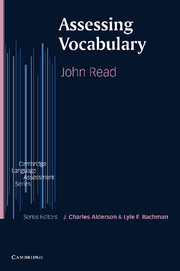Book contents
- Frontmatter
- Contents
- Series editors' preface
- Acknowledgements
- 1 The place of vocabulary in language assessment
- 2 The nature of vocabulary
- 3 Research on vocabulary acquisition and use
- 4 Research on vocabulary assessment
- 5 Vocabulary tests: four case studies
- 6 The design of discrete vocabulary tests
- 7 Comprehensive measures of vocabulary
- 8 Further developments in vocabulary assessment
- References
- Index
4 - Research on vocabulary assessment
Published online by Cambridge University Press: 03 May 2010
- Frontmatter
- Contents
- Series editors' preface
- Acknowledgements
- 1 The place of vocabulary in language assessment
- 2 The nature of vocabulary
- 3 Research on vocabulary acquisition and use
- 4 Research on vocabulary assessment
- 5 Vocabulary tests: four case studies
- 6 The design of discrete vocabulary tests
- 7 Comprehensive measures of vocabulary
- 8 Further developments in vocabulary assessment
- References
- Index
Summary
Introduction
In the previous chapter, we saw how tests play a role in research on vocabulary within the field of second language acquisition (SLA). Now we move on to consider research in the field of language testing, where the focus is not so much on understanding the processes of vocabulary learning as on measuring the level of vocabulary knowledge and ability that learners have reached. Language testing is concerned with the design of tests to assess learners for a variety of practical purposes that can be summarised under labels such as placement, diagnosis, achievement and proficiency. However, in practice this distinction between second language acquisition research and assessment is difficult to maintain consistently, because, on the one hand, language testing researchers have paid relatively little attention to vocabulary tests and, on the other hand, second language acquisition researchers working on vocabulary acquisition have often needed to develop tests as an integral part of their research design. Thus, some of the important work on how to measure vocabulary knowledge and ability has been produced by vocabulary acquisition researchers rather than language testers; the latter have tended either to take vocabulary tests for granted or, in the 1990s, to be interested in more integrative and communicative measures of language proficiency.
Other significant contributors to our understanding of vocabulary assessment are researchers on reading English as a first language. There is a long tradition of vocabulary work in reading research because of the strong, well-documented association between good vocabulary knowledge and the ability to read well.
- Type
- Chapter
- Information
- Assessing Vocabulary , pp. 74 - 116Publisher: Cambridge University PressPrint publication year: 2000
- 1
- Cited by



